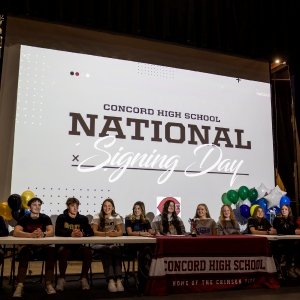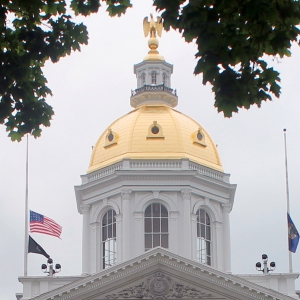Educators continue to fight against divisive concepts law

The House Education Committee meets in Representatives Hall to hear testimony on a bill seeking to repeal the “divisive concepts” teaching law on Jan. 12, 2023.
| Published: 01-16-2024 5:14 PM |
In the continuing fight against the “divisive concepts” law restricting how New Hampshire educators discuss topics such as race, gender identity and sexual orientation in classrooms, was back before a federal judge on Tuesday.
The plaintiffs were asking for summary judgment in their favor after arguing the law was unconstitutionally vague.
“The divisive concepts law is unconstitutional, a hindrance to students’ ability to receive an honest education and a cudgel being held over teachers’ heads to limit truthful lessons,” said Deb Howes, president of the American Federation of Teachers.
Enacted in 2021, this law prohibits K-12 public school teachers from engaging in discussions that may make students feel superior or inferior based on race, gender, sexual orientation or other identities.
However, critics argue that it hampers honest discourse on history, particularly regarding discriminatory practices and the legacy of discrimination experienced by marginalized groups.
“New Hampshire teachers should not be restricted from teaching honestly about history, gender, race or identity,” said Howes. “We can’t let extremists take over our public education system and limit inquiry and discussion and the right of all students to become engaged citizens in the real world. We shouldn’t go through another school year with teachers afraid their careers will be jeopardized, with some even leaving the profession, over an unconstitutional, politically inspired law.”
The court heard a motion for summary judgment brought by the plaintiffs Andres Mejia and Christina Kim Philibotte, directors of diversity, equity, inclusion, and justice in Exeter and Manchester school districts, along with the National Education Association – New Hampshire and AFT-NH, the state’s two largest teachers unions.
“New Hampshire’s classroom censorship law is an attack on educators who are simply doing their job, and through vagueness and fear it erases the legacy of discrimination and lived experiences of Black and Brown people, women and girls, LGBTQ+ people, and people with disabilities,” said Gilles Bissonnette, legal director of the ACLU of New Hampshire.
Article continues after...
Yesterday's Most Read Articles
 Casella Waste Systems’ landfill project in New Hampshire’s North Country denied permit
Casella Waste Systems’ landfill project in New Hampshire’s North Country denied permit
 ‘Less finger pointing, more communication’: Longtime Chichester residents share hopes before second town meeting
‘Less finger pointing, more communication’: Longtime Chichester residents share hopes before second town meeting
 ‘The revenue just isn’t there’: House Finance Committee slashes $271M in jobs, services from Ayotte’s budget proposal
‘The revenue just isn’t there’: House Finance Committee slashes $271M in jobs, services from Ayotte’s budget proposal
 12 Concord student-athletes sign on to play at the collegiate level
12 Concord student-athletes sign on to play at the collegiate level
 ‘There was no oversight’: NH child advocate has been a watchdog for children's care. Now, the office is on the chopping block
‘There was no oversight’: NH child advocate has been a watchdog for children's care. Now, the office is on the chopping block
 Volunteer group wants to help homeless clean up their camp
Volunteer group wants to help homeless clean up their camp
The issue lies in the potential consequences for teachers who violate the law — risking the loss or suspension of their licenses. Despite three years passing since the law’s enactment, no teachers have faced punishment, yet there is palpable uncertainty among educators regarding what is deemed acceptable under the law.
In a ruling in January 2023, the court acknowledged the severe consequences teachers face for teaching or advocating banned concepts.
“Given the severe consequences that teachers face if they are found to have taught or advocated a banned concept, plaintiffs have pleaded a plausible claim that the amendments are unconstitutionally vague,” the ruling stated, allowing the challenge against the law to proceed.







 Town elections offer preview of citizenship voting rules being considered nationwide
Town elections offer preview of citizenship voting rules being considered nationwide Medical aid in dying, education funding, transgender issues: What to look for in the State House this week
Medical aid in dying, education funding, transgender issues: What to look for in the State House this week On the Trail: Shaheen’s retirement sparks a competitive NH Senate race
On the Trail: Shaheen’s retirement sparks a competitive NH Senate race ‘If it affects one, it’s going to affect all’: Dozens protest federal firings in Concord
‘If it affects one, it’s going to affect all’: Dozens protest federal firings in Concord
